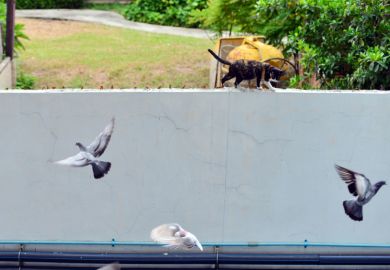Australian universities have given a lukewarm response to plans to assess them on their research impact and engagement activities from next year.
After a pilot earlier this year, education minister Simon Birmingham confirmed that the Engagement and Impact Assessment would be rolled out across the sector in 2018.
The Australian Research Council, which runs the exercise, said that the methodology would be simpler than the pilot, with universities being assessed on four quantitative engagement indicators, covering external research income and commercialisation revenue. In the pilot, there had been 11 engagement indicators.
Universities will also be able to submit a 750-word explanatory statement alongside the engagement indicators, plus a 1,000-word “engagement narrative”. This could include evidence from a range of optional indicators, including data on joint research supervision and co-authorship with industry and patent activity. As in the pilot, impact will be measured using case studies – one for each subject-based unit of assessment.
The exercise, which will run alongside the existing Excellence in Research for Australia assessment, will rate institutions’ engagement and impact as low, medium or high.
However, unlike the UK’s research excellence framework, which itself includes an assessment of impact, neither of the Australian exercises carries significant funding implications.
Mr Birmingham said that, while Australia’s universities had world-leading researchers, “we lag when it comes to university and industry collaboration”.
“By ensuring that researchers outline the way that they’re engaging with businesses and industry and assessing the impact that their work is having, these new measures will act as an incentive to drive more of that valuable work,” he said.
But Conor King, executive director of Australia’s Innovative Research Universities mission group, told Times Higher Education that the new assessment had “few fans” in the sector, despite the simpler methodology.
“The case studies to show impact are individually interesting and collectively demonstrate the value from Australian universities’ research,” he said. “But they reveal little about impact generally in the university for a field of research.
“Further, the assessments in the pilot simply left universities bemused at the ratings received. There is no confidence the full process will produce more plausible results.”
Search our database of jobs in Australia and New Zealand
Gavin Moodie, adjunct professor of education at Melbourne’s RMIT University, said that he feared the exercise would “erode Australia’s fundamental research capacity”.
“It reflects Australian conservative governments’ increasing diversion of public funding and bodies to serve the interests of private for-profit bodies, particularly big companies, to compensate for companies’ modest and reducing investment in their internal capacity,” he said.
Tanya Plibersek, the shadow education minister, said that the new assessment was a “waste of time and money”.
“Adding an unnecessary layer of bureaucracy within Australian universities will distract our best and brightest from their core job,” she said.
The Australian reforms follow the announcement in England of a new knowledge exchange framework, aimed at measuring universities’ knowledge exchange and business collaboration activities.
Academics have raised concerns that this will duplicate the impact elements of the REF, or will be little more than a “patent-counting exercise”.
Register to continue
Why register?
- Registration is free and only takes a moment
- Once registered, you can read 3 articles a month
- Sign up for our newsletter
Subscribe
Or subscribe for unlimited access to:
- Unlimited access to news, views, insights & reviews
- Digital editions
- Digital access to THE’s university and college rankings analysis
Already registered or a current subscriber?









